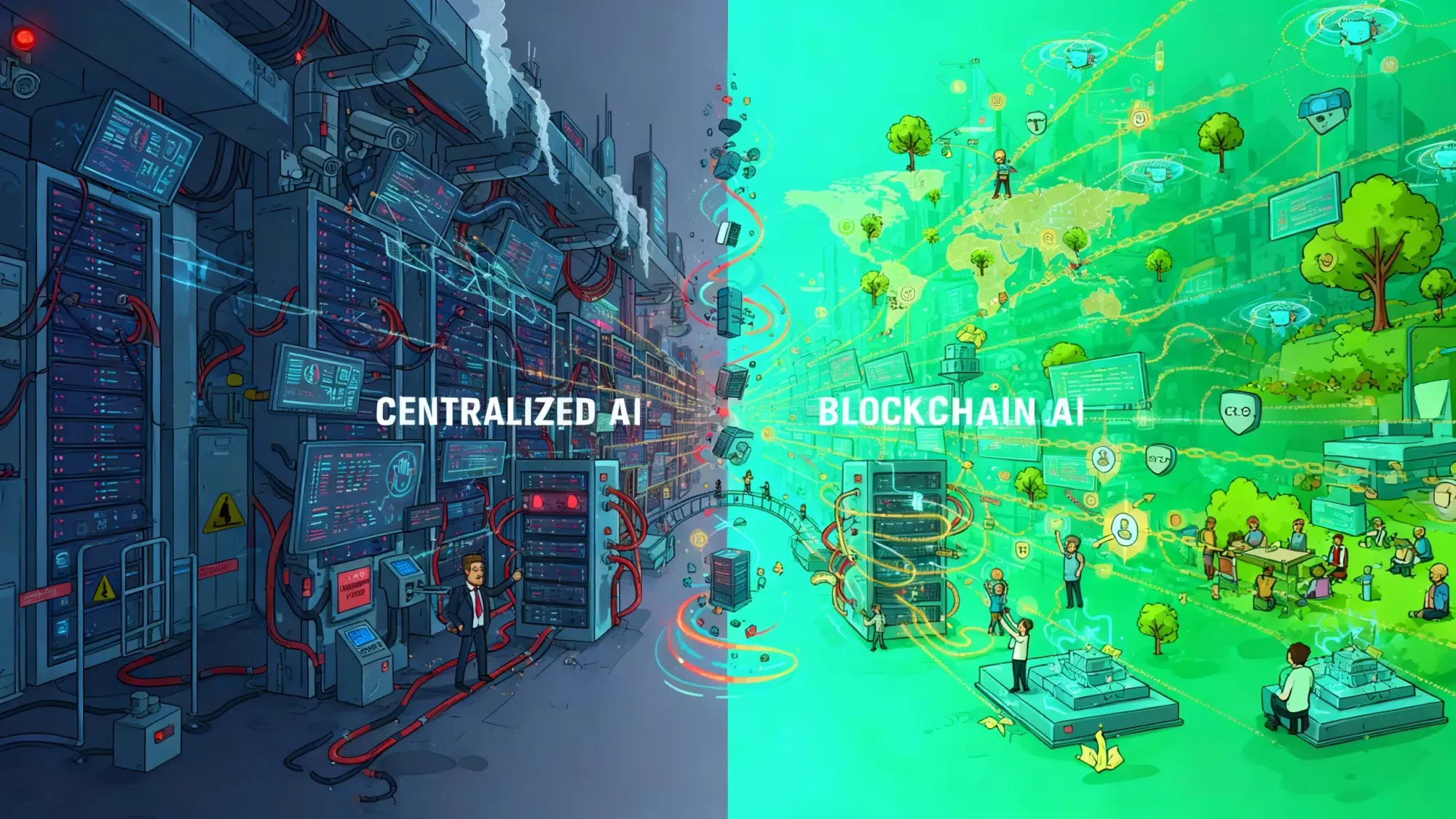Blockchain AI Agents vs Centralized AI Platforms: Which Is Better?

1. Introduction
As AI becomes increasingly integrated into business workflows, many companies are asking a crucial question: Are Blockchain AI Agents a better choice than centralized AI platforms? With concerns about data ownership, transparency, and long-term cost control, more enterprises have begun exploring decentralized agent architectures. Blockchain AI Agents offer a new approach where intelligence is autonomous, data is owned by users, and all operations are verifiable — a direction strongly supported by solutions like MEMO’s decentralized AI data layer.
2. What Centralized AI Platforms Actually Do
Centralized AI platforms operate under a simple model: users send data to a private server run by a large provider, the provider processes it, and returns results.
This setup is convenient, but it also creates several limitations:
- Data must be uploaded and stored by the provider — users lose control.
- Opaque decision-making — users cannot verify how the model used their data.
- Vendor lock-in — switching platforms is costly.
- Single-point risks — outages, censorship, or policy changes affect the entire system.
For fast prototyping, centralized AI is fine. But for long-term enterprise adoption, the black-box nature and data-hosting risks raise concerns.
3. How Blockchain AI Agents Work
Blockchain AI Agents operate on a decentralized foundation:
- Identity on-chain (DID)
- Data under user ownership
- Agent actions recorded transparently
- Execution supported by distributed resources (like DePIN)
Instead of relying on a single company’s infrastructure, these agents interact across blockchain networks, decentralized storage, and smart contracts.
This is exactly where MEMO Labs provides significant advantages. MEMO supplies:
- Decentralized identities (MEMO DID)
- User-controlled data through the MEMO Data Wallet
- ERC-7829 for tokenizing & assetizing data
- Decentralized storage and computing
- Encrypted, verifiable, traceable AI operation
Together, this creates a secure, verifiable, autonomous environment for agents that operate on behalf of the user, not on behalf of a platform.
4. Why Blockchain AI Agents Are More Trustworthy
4.1 Data Ownership & Sovereignty
In a centralized model, your data becomes part of the provider’s ecosystem.
In a blockchain agent model, especially with MEMO’s architecture:
- Data stays in your storage
- Access is granted by your rules
- Agents act according to policies bound to your DID
This ensures long-term sovereignty and regulatory alignment.
4.2 Full Transparency & Verifiable Actions
Every interaction and operation executed by a Blockchain AI Agent can be verified. Enterprises can audit:
- What data was used
- Which model version was called
- Which rule triggered the action
- What storage node handled the request
This level of transparency is impossible in centralized systems.
MEMO strengthens this through traceable and encrypted AI pipelines, providing on-chain proofs when necessary.
4.3 Decentralized Infrastructure = Lower Risk
Centralized providers depend on large data centers and internal operational policies. Blockchain AI Agents can rely on:
- Decentralized computing power (DePIN)
- Distributed storage networks
- Smart contract governance
MEMO’s decentralized storage and compute reduce dependency on costly cloud vendors, lowering infrastructure spending and improving resilience.
4.4 Incentives & Economics
Blockchain AI Agents can participate in open economies:
- Paying for compute
- Selling services
- Exchanging data
- Monetizing AI workflows
This natively integrates Web3 business models, something centralized AI cannot offer.
5. Where Centralized AI Still Has an Edge
To be fair, centralized AI platforms remain strong in certain areas:
- Extremely low-latency inference
- High-quality user interfaces
- Mature enterprise support
- Simplified onboarding for beginners
But these advantages weaken over time as decentralized AI networks scale and optimize — and MEMO’s infrastructure upgrade path is aligned with this trend.
6. Why Blockchain AI Agents Are Becoming the Better Enterprise Choice
For forward-looking companies, the advantages are increasingly clear.
6.1 Compliance-ready
Verifiable logs and decentralized identity help meet regulatory and audit demands.
6.2 Integration-friendly
Agents can plug into smart contracts, enterprise systems, and data wallets.
6.3 Future-proof data strategy
Data assetization (e.g., using ERC-7829) enables new monetization and governance models.
6.4 Lower long-term operating costs
Decentralized compute and storage reduce reliance on centralized cloud monopolies.
And with MEMO’s stack, enterprises don’t have to build everything from scratch — the ecosystem already provides the foundation: storage, DID, wallet, and decentralized execution.
7. Conclusion
When comparing centralized AI platforms with Blockchain AI Agents, the difference ultimately comes down to control, transparency, and long-term strategy. Centralized platforms offer convenience, but they require trust in a single provider and come with data risks. Blockchain AI Agents — especially those built on MEMO’s decentralized data infrastructure — provide autonomous intelligence where users retain ownership, actions are verifiable, and systems are resilient.
For businesses planning to scale AI in a secure and future-proof way, Blockchain AI Agents are the clear winner.
